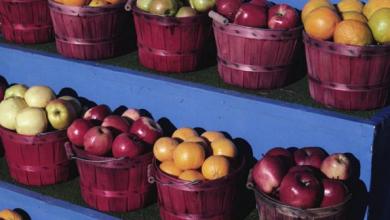New Mexico fruit and vegetable farmers get boost from FINI program
July 27, 2015
Source: Southwest Farm Press
Author: Logan Hawkes
Food Insecurity Nutrition Incentive (FINI) grant program, which provides thousands of families double the buying power for the purchase of fresh vegetables and fruits from local farmers markets
New Mexico’s fruit and vegetable farmers and the state’s low-income consumers are applauding the success of a USDA program, the Food Insecurity Nutrition Incentive (FINI) grant program, which provides thousands of families double the buying power for the purchase of fresh vegetables and fruits from local farmers markets.
New Mexicans enrolled in SNAP, the Supplemental Nutrition Assistance Program (formerly known as Food Stamps), are taking advantage of the program called “Double Up Food Bucks” to encourage participants to spend their benefits on fresh fruits and vegetables at 34 farmers markets across the state.
New Mexico Department of Agriculture officials say many families want to eat healthier, but paying for organic and fresh produce can be pricey, especially for those on low or fixed incomes.
The program is simple. A family that spends $10 in SNAP benefits at participating farmers’ markets across New Mexico receives an additional $10 in Double Up Food Bucks to purchase fresh farm-grown fruits and vegetables. In other words, a dollar spent on fresh food buys two dollars in fresh food products at participating markets.
New Mexico officials say the positive impacts of the program are three-fold: low-income families have increased access to and eat more healthy food; regional farmers gain new customers and make more money; and more food dollars stay in the local economy.
According to the New Mexico Farmers’ Marketing Association, the USDA awarded $100,000 for the program in May, and since then SNAP recipients have been flooding into participating farmer’s markets. The federal program is part of $31 million the federal agency awarded nationally and supplemented by state funds and support from non-profit and commercial funding sources.
The grant money was contained in the Agriculture Act of 2014.
According to program guidelines, FINI projects must have the support of the state agency responsible for administering the SNAP program. New Mexico lawmakers appropriated $400,000 toward the program last month. But under terms of the program, even if states are incapable of budgeting funds to support the project, USDA can assist them by securing non-profit and corporate grants and assistance to make the program available.
“New Mexico is the most food insecure state in the nation,” reports Terry Brunner, State Director for USDA Rural Development in New Mexico. He indicated the FINI program is a welcome service to help low-income families get on the road to healthier lifestyles.
Patricia Keane, a dietitian at the University of New Mexico’s Prevention Research Center, says research released by the USDA earlier this year found while all Americans need to improve their diets, particularly when it comes to eating fruits and vegetables, SNAP participants have the lowest intake of fruits and vegetables of all Americans.
Nearly 24 percent of New Mexico’s population qualifies for SNAP programs.
Promoting healthier lifestyles
Keane and other nutritionists hope the program will help families make better choices when purchasing food. In so doing, benefits could include helping to reduce childhood obesity, helping to manage the growing problem of diabetes, and promoting healthier and happier lifestyles for low income families.
New Mexico’s Human Services Department reports provided EBT machines, required to swipe SNAP cards, at no cost to farmers’ markets to make certain SNAP recipients “have access to fresh, locally grown foods.” The Double Up Food Bucks program will be available at 34 farmers’ markets across the state before the end of the season.
In neighboring Texas, the Double Up Food Bucks program is having a tough time gaining support from the Texas Legislature. During the last session, State Representative Eddie Rodriguez of Austin proposed House Bill 1616 that could have changed the way low-income Texans shop for food. But the bill was referred to the Livestock and Agriculture Committee twice and failed to move to the House floor.
Supporters of the bill say they were surprised at the lack of support for a bill that could eventually help the state save money by managing child health problems and reducing state funds spent on healthcare for children, and say they are hopeful lawmakers will have a change of heart during the next session.
The State of Michigan was the testing ground for a similar pilot program introduced five years ago. U.S. Senator Debbie Stabenow recently hailed the program as an innovative partnership that has resulted in healthier citizens and has benefited farmers across the state as well.
Michigan received $5.1 million from the U.S. Department of Agriculture (USDA) in April to expand its Double Up Food Bucks program. Stabenow says the funds will be used to better serve participants on SNAP by expanding the program to more farmers’ markets and grocery store locations across the state.
“We’ve proven that Double Up successfully boosts family nutrition and farmer earnings,” said Oran Hesterman, president and CEO of Michigan’s Fair Food Network and a former farmer, agronomist, and leader in philanthropy. “With this funding, we’ll reach even more people [better ways to eat healthy], supporting healthy food environments and resilient rural and urban communities.”
Another benefit is that the programs encourage low-income families to grow their own garden as the purchase of fruit and vegetable seeds qualify for as allowable Double Up purchases.
